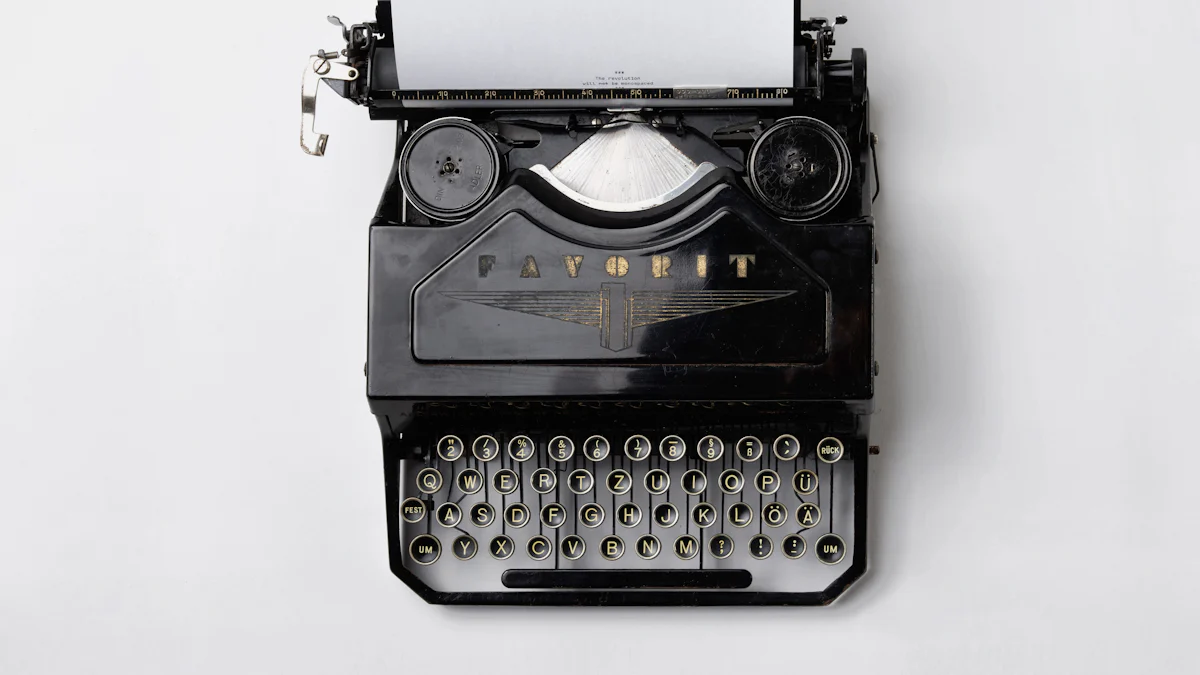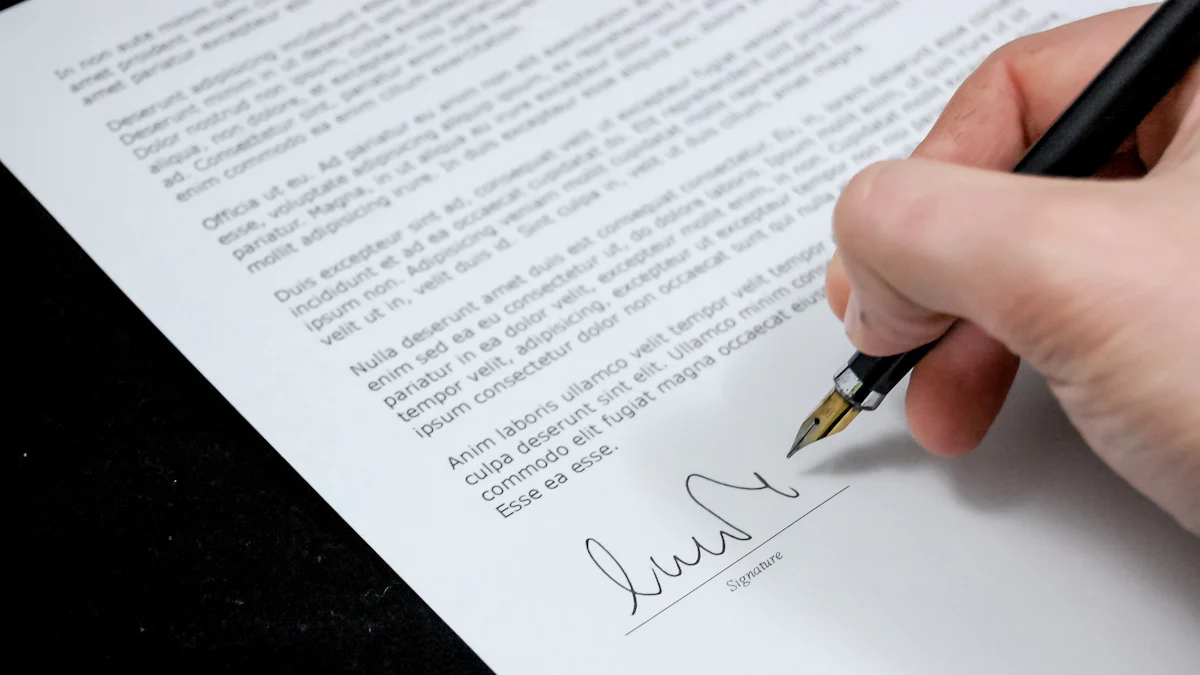How to End a Cover Letter Professionally with Examples
Try Aihirely for
Smarter Interview Prep
Experience real-time AI support tailored to your Resume.
Boost your confidence and ace every question with
AI Mock Interview.

Image Source: unsplash
The way you end a cover letter can make or break your chances of standing out. Recruiters spend just 7.4 seconds on each application, so a strong closing helps seal the deal. Use this final paragraph to summarize your qualifications, express genuine enthusiasm, and invite further discussion. It’s your chance to leave a lasting impression.
Thank you for considering my application. My background in data analysis and passion for innovative solutions make me an ideal fit for your team. I’d love to discuss how my experience aligns with your needs.
Knowing how to end a cover letter effectively can significantly boost your chances of landing an interview, especially when you understand the best practices for how to end a cover letter to leave a positive impact.
Key Takeaways
-
Briefly list your skills to show why you fit the job.
-
Thank the hiring manager for their time to stay polite.
-
Share excitement about the job and company to stand out.
How to End a Cover Letter with Key Elements
Summarize Your Qualifications Effectively
The closing paragraph is your last chance to remind the hiring manager why you’re the perfect fit. Keep it concise but impactful. Reiterate your top skills and how they align with the company’s needs. For example, you could say, “I believe my expertise in B2B content management and SEO will help your startup scale for growth.” This approach shows confidence without sounding boastful. Highlighting your qualifications here reinforces your value and leaves a strong impression.
Express Gratitude to the Reader
A little gratitude goes a long way. Thank the hiring manager for their time and consideration. It’s a simple yet professional way to end on a positive note. You might write, “Thank you for reviewing my application. I appreciate your time and look forward to discussing how my skills can benefit your team.” This not only shows respect but also keeps the tone warm and engaging.
Show Enthusiasm for the Role and Company
Employers want to hire people who are genuinely excited about the job. Use this section to express your enthusiasm for the role and the company. For instance, you could say, “I’m eager to join your innovative team and contribute to your company’s growth.” This demonstrates your passion and helps you stand out from other candidates. Enthusiasm is contagious, and it can make your application more memorable.
Include a Polite Call to Action
End with a clear and polite call to action. Invite the hiring manager to take the next step, such as scheduling an interview. A statement like, “I would love the opportunity to discuss my qualifications further and how I can contribute to your team’s success,” works well. This encourages further communication and shows you’re proactive. A strong call to action can leave the door open for meaningful engagement.
Mistakes to Avoid When Closing a Cover Letter
Avoid Overconfidence or Arrogance
Confidence is great, but overconfidence? Not so much. You want to show you’re qualified without sounding arrogant. Statements like, “I expect to hear back from you by next week,” can come across as pushy and entitled. Instead, keep your tone professional and respectful. For example, say something like, “I look forward to the opportunity to discuss my qualifications further.” This shows confidence without crossing the line. Remember, hiring managers appreciate enthusiasm, but they also value humility.
Steer Clear of Passive or Vague Language
Vague or passive phrases can weaken your closing and leave the wrong impression. Avoid saying things like, “I think I could probably do well in this role.” This kind of language makes you sound unsure of yourself. Instead, use clear and confident wording. For instance, “I am excited to bring my skills in project management to your team” is much stronger. Also, don’t forget to include a specific call to action. Research shows that cover letters without a clear next step are 35% less likely to lead to interviews. So, let the employer know how they can reach you and when you’re available.
Do Not Include Irrelevant or Repetitive Details
Your closing paragraph isn’t the place to rehash your entire cover letter or include unrelated information. Keep the focus on your professional qualifications. For example, avoid adding personal details like hobbies unless they directly relate to the job. Repeating the same points you’ve already made can also dilute your message. Instead, use this space to leave a strong final impression. A concise, well-crafted ending shows you know how to end a cover letter effectively and professionally.
Examples of Effective Cover Letter Closings

Image Source: pexels
Sample Closings for Entry-Level Roles
Crafting a strong closing for an entry-level cover letter can feel tricky, but it’s your chance to highlight your enthusiasm and potential. Even if you lack extensive experience, you can still leave a memorable impression. Here are some examples:
| Closing Statement | Why it Works |
|---|---|
| Although new to the professional world, I am eager to translate my academic knowledge into practical experience at [Company Name]. During my studies in [Relevant Major/Study], I have acquired skills in [skills] that I am confident will contribute positively to your team. I am excited about possibly starting my career at [Company Name] and would be thrilled to further discuss how I can support your objectives. Thank you for considering my application. | This closing effectively positions the candidate’s academic experience as preparation for the job and shows their enthusiasm in contributing to the company. |
| I am excited about the opportunity to begin my career at [Company Name] and contribute my enthusiasm and fresh perspectives. I look forward to discussing how my potential aligns with your organization’s goals. | This closing emphasizes enthusiasm and a willingness to learn, which are crucial for entry-level candidates. It highlights the candidate’s potential and aligns their fresh perspectives with the company’s objectives. |
These examples show how to end a cover letter with confidence and enthusiasm, even if you’re just starting out.
Sample Closings for Managerial or Mid-Level Positions
When applying for managerial or mid-level roles, your closing should reflect your expertise and readiness to contribute. Here are some effective examples:
-
Thank you for considering my application. I am looking forward to the opportunity to contribute my skills and experiences in this exciting role.
-
I am eager to discuss how my background aligns with your team’s goals and how I can contribute to your company’s growth.
-
I am confident that my expertise in social media marketing makes me well-suited for this position, and I appreciate your time and consideration.
-
I would appreciate the opportunity to discuss my qualifications in further detail and how I can contribute to the success of your team. Please feel free to contact me at your convenience to arrange an interview.
These closings strike the right balance between professionalism and enthusiasm, leaving a strong impression on hiring managers.
Sample Closings for Creative or Industry-Specific Roles
For creative or specialized roles, your closing should showcase your passion and unique skills. Here are some examples to inspire you:
-
This position seems like a perfect match for my experience, passions, and career aspirations.
-
I am eager to bring my expertise in brand storytelling and strategic vision to your team, helping to elevate your brand’s presence and drive impactful results.
-
I’d love to bring my expertise in crafting B2B sales messaging and passion for the environment to your team.
-
I am confident that my skills in [relevant skills] and my experience in [relevant industry] make me an ideal candidate for this role.
These examples demonstrate how to end a cover letter in a way that highlights your creativity and enthusiasm while aligning with the company’s goals.
Professional Sign-Offs and Final Touches

Image Source: unsplash
Choosing the Right Sign-Off (e.g., “Sincerely,” “Best regards”)
The way you sign off your cover letter matters more than you might think. It’s the final touch that leaves a lasting impression. Choosing the right sign-off depends on the tone you want to convey. Here’s a quick guide to help you decide:
| Sign-off | Description |
|---|---|
| Sincerely | Conveys a high degree of formality and respect, suitable for traditional industries. |
| Yours faithfully | Adds a touch of personal warmth while maintaining professionalism. |
| Best regards | Slightly less formal, yet conveys respect, suitable for modern businesses. |
| Kind regards | Demonstrates respect and professionalism, adaptable to various situations. |
| Respectfully | A safe choice when unsure of the company’s expectations. |
When picking a sign-off, think about the company culture. For example, “Sincerely” works well for formal industries like law or finance. If you’re applying to a creative or tech company, “Best regards” or “Kind regards” might feel more natural. Avoid casual phrases like “Cheers” or “Take care,” as they can come across as unprofessional.
Should You Include a Signature for Digital or Printed Submissions?
Adding a signature to your cover letter can elevate its professionalism. Whether you’re submitting digitally or on paper, here’s what you need to know:
-
For printed cover letters, include a handwritten signature between your closing phrase and your typed name. Use blue or black ink for a clean, professional look.
-
For digital submissions, typing your name after the sign-off is acceptable. However, inserting a scanned handwritten signature can make your application stand out.
-
If you choose to add a handwritten signature digitally, ensure there’s enough space for it to look neat and intentional.
A signature shows attention to detail and adds a personal touch. Just make sure it’s legible and free of smudges. Whether handwritten or typed, it’s a small step that can leave a big impression.
A strong cover letter closing can make all the difference in leaving a lasting impression. Here’s why it matters:
-
It connects your key accomplishments to the job and shows gratitude to the hiring manager.
-
It maintains a professional and polite tone while expressing enthusiasm for the role.
-
It ends with a polished salutation, ensuring professionalism throughout.
By applying these tips, you can craft a closing that stands out. For example, you might say, “I would welcome the opportunity to discuss how my qualifications align with your needs. I look forward to hearing from you soon.” A thoughtful ending like this sets the stage for meaningful communication with the employer. So, take the time to perfect your closing—it’s worth it!
FAQ
How long should my cover letter closing paragraph be?
Keep it short and impactful—2-3 sentences work best. Focus on summarizing your qualifications, expressing enthusiasm, and including a polite call to action.
Can I use humor in my cover letter closing?
It depends on the company culture. For creative roles, light humor might work. For formal industries, stick to a professional tone to avoid misinterpretation.
Should I include my contact information in the closing?
No need to repeat it if it’s already in your header. Instead, focus on a strong call to action and let your resume handle the details.
